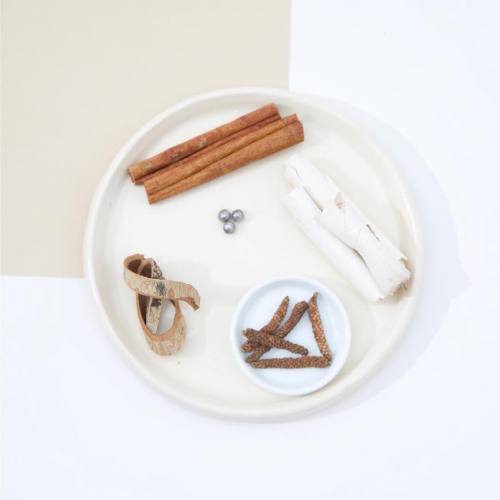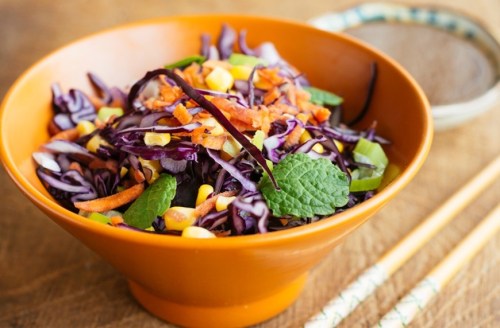Our editors independently select these products. Making a purchase through our links may earn Well+Good a commission
You’re already obsessed with the glow-inducing powers of your fave K-beauty sheet mask—why stop at your top shelf when incorporating Korean practices into your wellness rituals and dinner recipes? “When you go to Korea, you hear about people being obsessed with their Korean skin care, but healthcare is super progressive in Korea as well,” says Grace Yoon, founder of QiAlchemy, a recently launched Korean herbal supplement line. “Koreans integrate Western and Eastern practices. We take natural ways to really heal our bodies before taking [synthetic] medicine,” she says.
As Yoon explains it, Korean living is all about chi, AKA balance. It’s so ingrained in the Korean culture—the way they eat, manage stress, live—that they don’t even really think of their daily balancing acts as “habits.” Here in the States, though, lifestyle often tips to one end of the scale. Offered up here are easy ways to adopt some chi-enhancing practices, primarily with food and herbs.
Keep reading for Korean-inspired tips for cooking your way to a more balanced life.

Experiment with Korean herbs that bring balance
When Yoon was little, she had an unexplainable chronic illness that made her so tired she often didn’t have the energy to go to school. Her grandmother, an Eastern medicine doctor, treated Yoon with acupuncture and by mixing up special herbal elixirs for her to drink. After eight months, Yoon had recovered. Even though she was young, experiencing the power of holistic healing first-hand stayed with her. Now, she’s passionate about giving others a way to experience the same restorative benefits.
Working with a highly respected traditional Korean medical doctor, she created a line of herbal blends. “There are so many beneficial herbs out there,” she says. “[Our blends are] formulated to help aid digestion, manage stress, and lower inflammation,” she says. Some of the superstars: ginger (good for digestion), ginseng (boosts energy and harmonizes the blood), licorice root (another powerhouse digestive aid), and puerariae (linked to lowering inflammation).
Working inflammation-fighting herbs into your diet (whether that’s through teas, in cooking, or with supplements) is one way to start getting a bit more balanced. Other popular herbs in Korea to start experimenting with include dried clementine, atractylodis, and cinnamon—all of which are linked to promoting good digestion, immunity, and, of course, chi. (Pro tip: Buy what you can’t find at the grocery store at a local Korean market or on Amazon.)

Eat probiotic and fermented foods to keep your gut happy
In Korea, popping probiotics isn’t a daily habit like it is in the U.S.; Koreans are already getting their fix through food. “The way Koreans eat is really the key to why they are pegged to be the longest living country by 2030,” says Korean Food Made Simple author Judy Joo. “A wide array of side dishes, called banchan, accompany every meal and offer up Korea’s wide harvest from the mountains, valleys, fields, and seas. It’s this way of balanced eating that makes for balanced digestion,” Joo says.
Everyday Korean author Kim Sunée is in total agreement. “Eating foods that promote good gut health is ingrained in the culture,” she says. “There, kimchi there isn’t a fad—it’s something they eat every day.”
The vast majority of banchan are plant-based, Sunée points out, and many of them (like kimchi) are fermented. They’re as simple as bean sprouts seasoned with sesame, scallions, and garlic; a bowl of pickled radishes; seaweed; or spicy cabbage. At every meal, veggies take center stage. (It’s not wonder fermented foods and veggies are part of the “good gut health rule of five.”)
“The way Koreans eat is really the key to why they’re pegged to be the longest living country by 2030.” —Judy Joo, author of Korean Food Made Simple
Joo also points out that when Koreans are making their veggies, they make ’em with spices and herbs loaded with antioxidants and digestive benefits such as garlic, ginger, and sesame. The end result is benefits on top of benefits—literally.
How to cook with kimchi and other healthy Korean foods
Figuring out how to eat more kimchi—or fermented anything—can feel like a leap, but Joo offers up some easy ways to do it: “Use it as a topping or condiment” she says. When you think of it that way, kimchi works on tacos, in salad, soup…whatever you’re already comfortable whipping up for dinner.
Another good-for-you Korean cooking rule that’s easy to adopt is to think more about your cooking oils. Joo says sesame oil is a Korean staple. “It’s full of healthy fats and also adds the most gorgeous fragrance and nutty flavor to your dishes,” she says.
It’s this herbs and food as medicine approach that can lead to living a balanced life from the inside out. And for when you need an added boost to really bring out your inner glow, there’s always those cult fave K-beauty go-tos.
Miso is another fermented powerhouse to experiment in the kitchen with. Plus, a Korean supplement full of benefits, including collagen.
Sign Up for Our Daily Newsletter
Get all the latest in wellness, trends, food, fitness, beauty, and more delivered right to your inbox.
Got it, you've been added to our email list.











